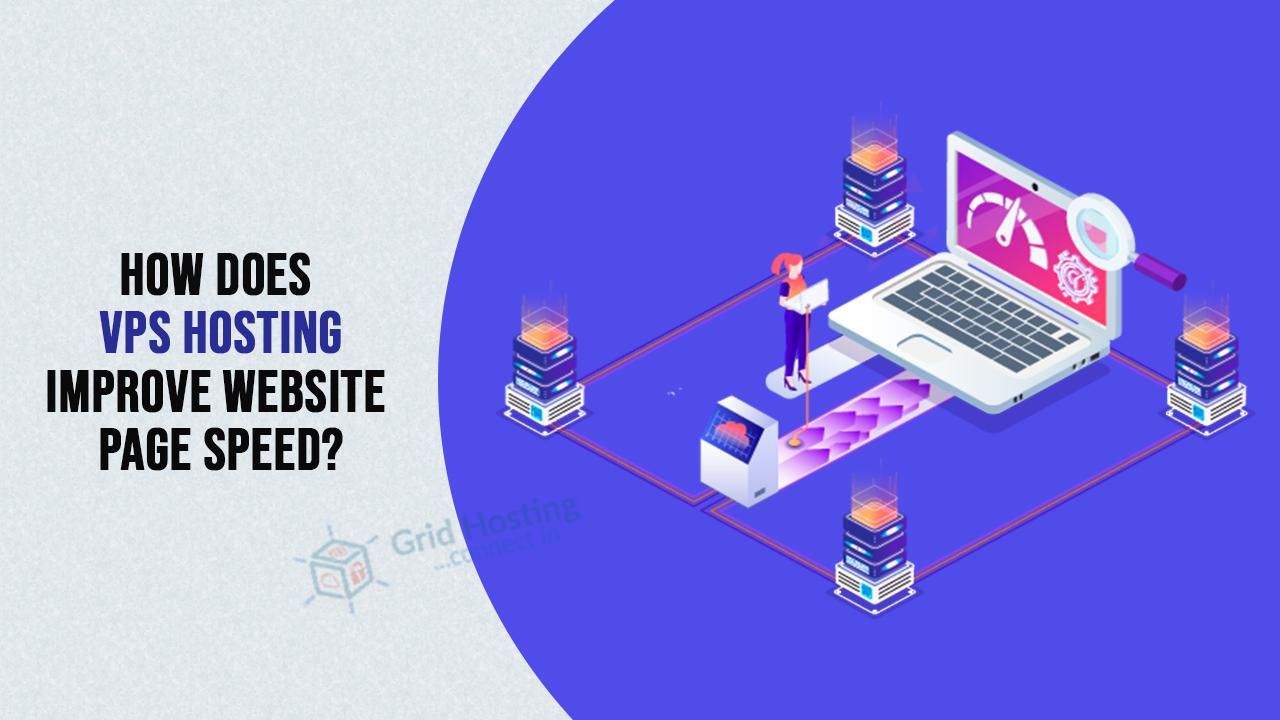Generally, we switch from shared hosting to VPS for two reasons. First, shared hosting is no longer enough for our traffic requirements. Or, we are looking to increase our web page speed. VPS hosting is famous for its ability to improve the website page speed.
This article will explain how Virtual Private Servers make our pages load with great speed. Other than definitions, we will also discuss the following points:
- Impact of Loading Speed on SEO & UX
- Qualities of VPS That Lead to Better Website Page Speed
- How To Test The Speed of Your Website?
- Other Factors That Decrease The Web Page Speed
- What Can You Do To Improve Website Page Speed?
What is a Virtual Private Server?
VPS is a server that uses virtualization technology for hosting services. It assigns dedicated resources to many users within one server. Therefore, VPS is the safest and most reliable solution if you cannot get a dedicated server.
How is a VPS Server Different From A Shared Server?
Both use a single server to run many websites. However, VPS comes with a guarantee of resources. This point is the primary factor behind the good speed. As long as traffic is low, both shared, and VPS servers will work fine. But when traffic increases, the difference becomes prominent.
The shared server will decide which website has the higher priority. All the other websites will experience low speed and may lose their clients as the user experience will be bad.
However, the speed of all websites will still be the same and high on the VPS servers. The recipe of dedicated resources does not let any single website suffer. Hence, businesses do not have to worry about losing their customers.
What is Website Page Speed?
Website Page Speed is the time a web page takes to load. It starts from the moment the user browser makes the request. It ends at the moment the entire page loads in the browser.
Page Speed is the first thing that someone observes when visiting your website. Most of the users stay if the page loads in one or two seconds. However, if it exceeds three seconds, most users will leave the page. So, slow-loading pages can kill your conversions. Statistics show that 40% of users will shut down your page and move to another if the loading time is more than three seconds.
Good website page speed has a plethora of advantages. It enhances your website's user experience and leads to better search engine rankings. User Experience and Search Engine Optimization have a direct connection. SEO is all about search engines ranking the website high. UX is one of the major contributing factors in SEO.
Impact of Loading Speed on SEO & UX
SEO requires websites to be fast. In fact, Google loves fast-loading websites. It is one of the key factors that search engines check when ranking websites. Good loading speed increases the page views, improves conversions, and reduces bounce rate.
The bounce rate calculates the percentage of people who do not make a second request after visiting your website. They do not open any other pages of your websites and sometimes do not even read the full page. The lesser bounce rates mean that the majority has made the second request.
On the other hand, slow speed results in poor user experience, as the visitors keep waiting for the website to load. They may also share their opinion about your website with their friends.
How VPS Improves Website Loading Speed
We know that VPS offers dedicated resources to every website. Every website gets its virtual CPU, bandwidth allocation, dedicated RAM, etc. VPS makes this possible by providing its own operating system. However, many VPS companies can also do some extra great things to help you ensure more incredible speeds with control over resources.
The first is browser caching. It is beneficial to save the data from a previously loaded page. You can load the page quickly when re-accessing it. The browser finds this data and loads the page. They do not have to search for the data at the server every time, which can waste time.
The second is redirect. If the links are broken, the websites show the error 404. VPS implements redirects, so servers show either the home page or the page they last surfed when the user visits these pages.
The third is image optimization. If there are high dimensions photos on your page, they may take some time to load. VPS optimizes them to load quickly.
Fourth is specifying the dimensions. For running a web page, URLs must have fixed dimensions. VPS fixes them to provide high speed.
Qualities of VPS That Lead to Better Website Page Speed
Here are some of the supreme qualities of Virtual Private Servers that provide impressive speed.
- VPS provides complete privacy. No other website can consume your dedicated portion of the server.
- The second excellent quality is the room for customization. You are using your operating system and enjoying access to applications like PHP, MySQL, etc.
- Third on the list is control. You get better control over the behavior of the server. Moreover, you can install applications that increase speed.
How Can You Test The Speed of Your WebPage?
Let us tell you about a great tool for measuring the speed of your web page. Its name is Pingdom. Just visit their website, type your address, select the location, and press the Start Test button.
The tool takes some time to analyze your website correctly. They do not just tell the speed but also give other valuable insights about the website.
Other Factors That Decrease The Web Page Speed
It is not always traffic that causes the web page speed to decrease. Instead, there are technical faults that are more about the design mistakes of the website. If your website is taking a long time to load, chances are:
- There are too many features installed on the website.
- The server is full of heavy web applications.
- There are heavy graphics files like videos and images.
What Can You Do To Improve Website Page Speed?
- You can disable hotlinking. Any other website cannot embed any content from your data. If they can, it will increase the load on your website.
- You can update script versions. WordPress is the foundation of most websites today, and it uses PHP scripts. Updating the latest PHP versions may also help you.
- You can delete the unnecessary features.
- Finally, you can move to good VPS hosting.



 Photo by
Photo by  Photo by
Photo by 

 Photo by
Photo by  person holding black smartphone on white textile
Photo by
person holding black smartphone on white textile
Photo by  StableDiffusion
StableDiffusion
 Photo by
Photo by  Photo by
Photo by 
 roommate as a therapist
StableDiffusion
roommate as a therapist
StableDiffusion
 woman in white shirt eating pizza
Photo by
woman in white shirt eating pizza
Photo by  person holding remote pointing at TV
Photo by
person holding remote pointing at TV
Photo by  person holding assorted clothes in wooden hanger
Photo by
person holding assorted clothes in wooden hanger
Photo by  a couple of
a couple of  friends cleaning apartment
StableDiffusion
friends cleaning apartment
StableDiffusion
 man driving car during golden hour
Photo by
man driving car during golden hour
Photo by  bacon strips and melted cheese topped fries on oval white and blue platter with gray stainless steel forks
Photo by
bacon strips and melted cheese topped fries on oval white and blue platter with gray stainless steel forks
Photo by  selective focus photography of eyeshadow palette
Photo by
selective focus photography of eyeshadow palette
Photo by  brown wooden framed white padded chair in between green indoor leaf plants inside bedroom
Photo by
brown wooden framed white padded chair in between green indoor leaf plants inside bedroom
Photo by  women forming
women forming  taking
taking  man in red polo shirt pouring wine on clear wine glass
Photo by
man in red polo shirt pouring wine on clear wine glass
Photo by  woman in black jacket standing on road during daytime
Photo by
woman in black jacket standing on road during daytime
Photo by 
 StableDiffusion
StableDiffusion
 StableDiffusion
StableDiffusion
 student thinking i shouldnt have procrastinated all semester
StableDiffusion
student thinking i shouldnt have procrastinated all semester
StableDiffusion
 Photo by
Photo by  Photo by
Photo by  Photo by
Photo by  StableDiffusion
StableDiffusion
 StableDiffusion
StableDiffusion
 Photo by
Photo by  Photo by
Photo by 








